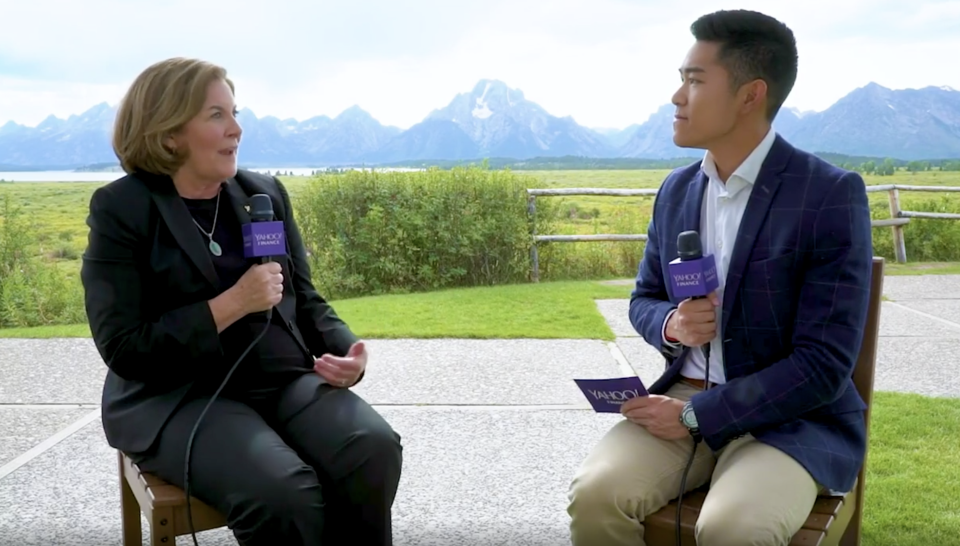Fed's George: Rate cuts 'not likely to resolve' trade uncertainty
A key Federal Reserve policymaker says interest rate cuts are not the appropriate response to trade concerns, revealing a split within the central bank over the proper way to respond to the White House’s spat with China.
Kansas City Fed President Esther George told Yahoo Finance that businesses are facing higher uncertainty over the ongoing U.S.-China trade war but expressed skepticism over the potency of Fed policy in addressing those concerns. George is a voting member of this year’s Federal Open Market Committee.
“Cutting interest rates is not likely to resolve that uncertainty,” George said on the sidelines of the Jackson Hole Symposium, an annual central banking conference hosted by the Kansas City Fed. “I take that into account when I think about how will our policy settings help in these situations. Or are there other things we should be taking into account?”
[See Also: Fed's George: It's 'too soon' to judge next move on rates]
George notably voted against the Fed’s decision on July 31 to cut interest rates by 25 basis points, saying that the U.S. economic outlook was not dark enough to warrant easing policy. Minutes from that meeting, released on Wednesday, showed a wide spectrum of policy recommendations from Fed officials, ranging from 50 basis point cuts to no cuts at all.
Defending the decision to cut by 25 basis points, Fed Chairman Jerome Powell said July 31 that the cut was necessary to “insure against downside risks” from trade tensions. He noted that businesses have pulled back on capital spending amid the uncertainty.
Days after that rate cut, Trump threatened a new round of 10% tariffs of $300 billion of additional Chinese goods, originally scheduled for Sept. 1. After markets tanked on the news, Trump announced he would delay tariffs on some consumer goods.
Although George recognized that trade policy and a possible slowdown abroad remain risks, she said she would want to wait for the economy to see a materially weaker outlook before moving on rates.

“Uncertainty is a challenging one. It doesn't mean it can't affect the real economy and I think the more persistent that uncertainty is, that's what I’m watching for,” George said. She added that one example would be a negative spillover into consumer confidence.
The consumer, which represents about 70% of the economy, has been a bright spot of the U.S. picture so far. The Commerce Department reported last week that retail sales grew by an estimate-beating 0.7% in July, showing that tariffs have not severely damaged consumer activity so far. In July, consumer confidence as measured by The Conference Board, also rebounded.
Cutting rates risks leveraging the economy
George said lowering rates may actually introduce new risks to the financial system.
“Easing policy is designed to pull forward demand. That can result in more leverage because it makes borrowing cheaper. So what I think about is, do you want to continue leveraging the economy at a time when you are also watching where weaknesses are?”
Policymakers have paid close attention to build-up in corporate debt and leveraged loan markets, which have become hot sources of financing for companies amid persistently low interest rates.
Boston Fed President Eric Rosengren, an FOMC voter who joined George in dissenting against the July rate cut, has also cited corporate leverage as a reason for not easing policy.
George said she has particular concerns over stability because of the rural nature of her Fed district, which covers Wyoming, Colorado, Nebraska, Kansas, Oklahoma, and parts of Missouri and New Mexico. She said ensuring access to credit is most important to small communities, hence why she prioritizes the safety of the banking system.
“My background has been in regulation as a bank examiner and my perspective often gears off of how does stability and the economy coincide with the Fed's mandates?”
The Fed will be convening in Jackson Hole from August 22 through August 24. The next FOMC meeting will take place September 17 and 18.
-Jillian Harding and Daryen Ru contributed to this report
Brian Cheung is a reporter covering the banking industry and the intersection of finance and policy for Yahoo Finance. You can follow him on Twitter @bcheungz.
Bonds, yields, and why it matters when the yield curve inverts: Yahoo U
YIELD CURVE INVERTS: Recession indicator flashes red for first time
Congress may have accidentally freed nearly all banks from the Volcker Rule
Read the latest financial and business news from Yahoo Finance

